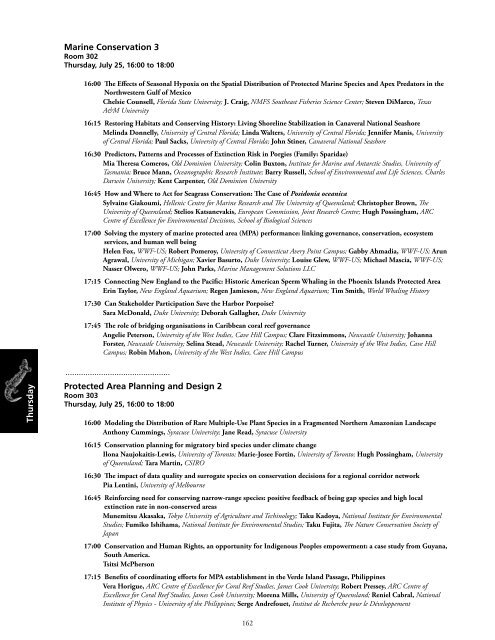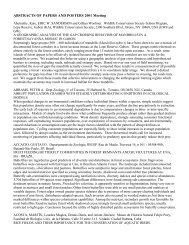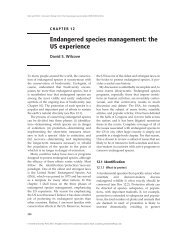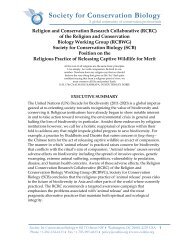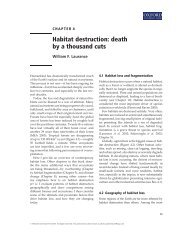ICCB 2013 Program - Society for Conservation Biology
ICCB 2013 Program - Society for Conservation Biology
ICCB 2013 Program - Society for Conservation Biology
Create successful ePaper yourself
Turn your PDF publications into a flip-book with our unique Google optimized e-Paper software.
Marine <strong>Conservation</strong> 3<br />
Room 302<br />
Thursday, July 25, 16:00 to 18:00<br />
16:00 The Effects of Seasonal Hypoxia on the Spatial Distribution of Protected Marine Species and Apex Predators in the<br />
Northwestern Gulf of Mexico<br />
Chelsie Counsell, Florida State University; J. Craig, NMFS Southeast Fisheries Science Center; Steven DiMarco, Texas<br />
A&M University<br />
16:15 Restoring Habitats and Conserving History: Living Shoreline Stabilization in Canaveral National Seashore<br />
Melinda Donnelly, University of Central Florida; Linda Walters, University of Central Florida; Jennifer Manis, University<br />
of Central Florida; Paul Sacks, University of Central Florida; John Stiner, Canaveral National Seashore<br />
16:30 Predictors, Patterns and Processes of Extinction Risk in Porgies (Family: Sparidae)<br />
Mia Theresa Comeros, Old Dominion University; Colin Buxton, Institute <strong>for</strong> Marine and Antarctic Studies, University of<br />
Tasmania; Bruce Mann, Oceanographic Research Institute; Barry Russell, School of Environmental and Life Sciences, Charles<br />
Darwin University; Kent Carpenter, Old Dominion University<br />
16:45 How and Where to Act <strong>for</strong> Seagrass <strong>Conservation</strong>: The Case of Posidonia oceanica<br />
Sylvaine Giakoumi, Hellenic Centre <strong>for</strong> Marine Research and The University of Queensland; Christopher Brown, The<br />
University of Queensland; Stelios Katsanevakis, European Commission, Joint Research Centre; Hugh Possingham, ARC<br />
Centre of Excellence <strong>for</strong> Environmental Decisions, School of Biological Sciences<br />
17:00 Solving the mystery of marine protected area (MPA) per<strong>for</strong>mance: linking governance, conservation, ecosystem<br />
services, and human well being<br />
Helen Fox, WWF-US; Robert Pomeroy, University of Connecticut Avery Point Campus; Gabby Ahmadia, WWF-US; Arun<br />
Agrawal, University of Michigan; Xavier Basurto, Duke University; Louise Glew, WWF-US; Michael Mascia, WWF-US;<br />
Nasser Olwero, WWF-US; John Parks, Marine Management Solutions LLC<br />
17:15 Connecting New England to the Pacific: Historic American Sperm Whaling in the Phoenix Islands Protected Area<br />
Erin Taylor, New England Aquarium; Regen Jamieson, New England Aquarium; Tim Smith, World Whaling History<br />
17:30 Can Stakeholder Participation Save the Harbor Porpoise<br />
Sara McDonald, Duke University; Deborah Gallagher, Duke University<br />
17:45 The role of bridging organisations in Caribbean coral reef governance<br />
Angelie Peterson, University of the West Indies, Cave Hill Campus; Clare Fitzsimmons, Newcastle University; Johanna<br />
Forster, Newcastle University; Selina Stead, Newcastle University; Rachel Turner, University of the West Indies, Cave Hill<br />
Campus; Robin Mahon, University of the West Indies, Cave Hill Campus<br />
Thursday<br />
...............................................<br />
Protected Area Planning and Design 2<br />
Room 303<br />
Thursday, July 25, 16:00 to 18:00<br />
16:00 Modeling the Distribution of Rare Multiple-Use Plant Species in a Fragmented Northern Amazonian Landscape<br />
Anthony Cummings, Syracuse University; Jane Read, Syracuse University<br />
16:15 <strong>Conservation</strong> planning <strong>for</strong> migratory bird species under climate change<br />
Ilona Naujokaitis-Lewis, University of Toronto; Marie-Josee Fortin, University of Toronto; Hugh Possingham, University<br />
of Queensland; Tara Martin, CSIRO<br />
16:30 The impact of data quality and surrogate species on conservation decisions <strong>for</strong> a regional corridor network<br />
Pia Lentini, University of Melbourne<br />
16:45 Rein<strong>for</strong>cing need <strong>for</strong> conserving narrow-range species: positive feedback of being gap species and high local<br />
extinction rate in non-conserved areas<br />
Munemitsu Akasaka, Tokyo University of Agriculture and Techinology; Taku Kadoya, National Institute <strong>for</strong> Environmental<br />
Studies; Fumiko Ishihama, National Institute <strong>for</strong> Environmental Studies; Taku Fujita, The Nature <strong>Conservation</strong> <strong>Society</strong> of<br />
Japan<br />
17:00 <strong>Conservation</strong> and Human Rights, an opportunity <strong>for</strong> Indigenous Peoples empowerment: a case study from Guyana,<br />
South America.<br />
Tsitsi McPherson<br />
17:15 Benefits of coordinating ef<strong>for</strong>ts <strong>for</strong> MPA establishment in the Verde Island Passage, Philippines<br />
Vera Horigue, ARC Centre of Excellence <strong>for</strong> Coral Reef Studies, James Cook University; Robert Pressey, ARC Centre of<br />
Excellence <strong>for</strong> Coral Reef Studies, James Cook University; Morena Mills, University of Queensland; Reniel Cabral, National<br />
Institute of Physics - University of the Philippines; Serge Andrefouet, Institut de Recherche pour le Développement<br />
162


